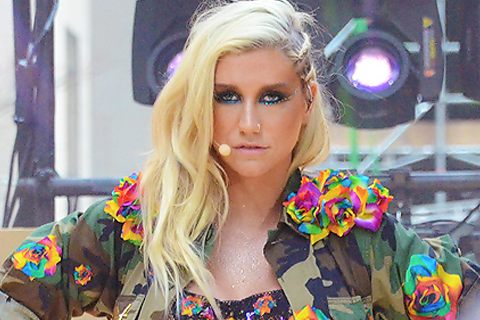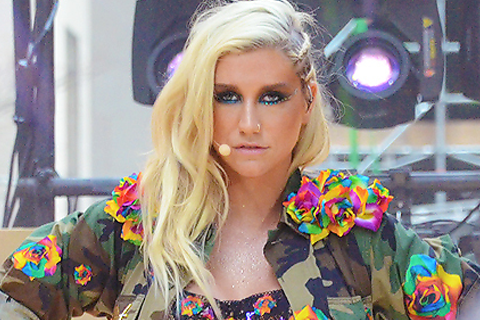Sign up to stay in the loop on new styles and sales!
Sign up to stay in the loop on new styles and sales!
On Kesha, the Justice System, and Media Distractions
thinx archive
·5 min read

by Team Thinx | 02/25/2016
This week, we’ve got two perspectives on the Kesha case.
Written by Kelsey Duchesne and Emma Glassman-Hughes
KELSEY
We have been singing backup for Kesha for a long time. In 2009, she released her first major hit, Tik Tok, and the nation joined her in a rolicking story of one wild party. As a high schooler that didn’t drink, I didn’t connect with the song through personal experience per se (i.e., I was not brushing my teeth with whiskey), but I remember blasting the song in my car on the way to school and trying to imitate Kesha’s energy and confidence. She felt so fresh at the time-- a beautiful pop star who was loud, and provocative, and distinctive. And she had a freakin’ dollar sign in her name! On the cover of the album, Kesha was scowling, with eyeliner smeared and glitter falling in front of her face. “Tonight, I’m-a fight, ‘til we see the sun rise,” we sang, offering ourselves to her as eager allies. We weren't quite sure what we were fighting for, but we were happy to join in.

Image by Becky Sullivan via Wikimedia Commons
In 2016, Kesha’s not singing anymore. The same loud, outspoken persona we tried to mirror at college parties and karaoke bars wants to leave her recording contract with Sony because she feels unsafe working with producer Dr. Luke, a longtime collaborator who she has accused of sexual and emotional abuse. A man who she has claimed abused her to the point where she needed rehabilitation, and who she does not feel comfortable working with in any capacity. Kesha set down her massively successful career and paused her pop star persona to speak up as herself, Kesha the person, and confirm that she does not feel safe in her current situation--a move that’s been called brave by many.
But, on February 19th, New York Supreme Court Justice Shirley Kornreic declared that there “Has been no showing of irreparable harm. She's being given opportunity to record.” In other words, Kesha: you have no hard proof of the mental and sexual torment you have described, so we can’t help you. But you can still sing. Go ahead, go sing.
This case has never been about Kesha still having the opportunity to record; that isn’t the point. The point is that a woman is afraid to show up to work because her boss is abusing her. The point is that Kesha probably isn’t the first pop star to experience something like this, but she’s in an industry where pop stars, ironically, are meant to be seen and not heard. The point is that if Kesha wanted to walk back into Sony and make another hit record, she probably could, but it’s not worth losing herself. The point is that telling Kesha that she can “still record” under a label that has failed to personally protect her and is silencing her, is really silencing every woman who has been abused and told to stop talking. The same pop star that we have always loved for a lack of filter is now being punished for it, because she’s using her voice to save herself. How long before we lose her voice all together because we are not listening?
Emma, myself, and Team THINX will not silence Kesha-- we will stand with her. We will soak in every word, and we won’t get distracted by venomous media outlets trying to distract us from her story. We hope this disappointing outcome will prompt discussion, and create an opportunity to find the right solution. We are still listening, and we know what we’re fighting for. This isn’t over. Kesha, we will always sing backup for you.
EMMA
Here’s the thing about ‘the media’: sometimes, it’s the tits (cue up some “Dog Saves Baby” headlines for reference), but other times, it’s the strong-armed essence of the patriarchy (cue up basically everything else). Alright, not eeeverything, but on the real, media outlets have a long history of profiting off of the abasement of women, in everything from upholding and perpetuating unhealthy standards of beauty, to crafting and selling degrading stereotypes as inherently characteristic to women. The combination of our 24-hour news cycles and the constant need for jaw-dropping headlines hardly ever bodes well for women, either; just to get enough clicks and shares, ‘journalistic’ sources often get lazy and spin stories out of thin air that feed off messy gossip, often aimed at bringing down a woman or two in the process.
This focus on pitting women against one another is not only lazy and incongruous, but a tool that the patriarchy can wield at any time to distract us from the severity or urgency of the real issues at hand. Just within the past year, we’ve seen it with Nicki, Taylor, and Miley, where the real issue was misogynoir in the music industry; we’ve seen it with Gloria, Madeleine, and millennial feminists (not actually the monolith we’re led to believe, btw), where the real issues were young women voters and the lack of female representation in politics; we’ve seen it with Kim and Amber, where the real issue was slut-shaming. The list goes on, and the issues continue to be lost in an over-simplified and negligent narrative that boils down legitimate politics to something that more closely resembles mockery; A.K.A., those silly girls can never seem to get along!
Well, people-- sexism be damned! We’re not going to let this one take a backseat. While singer and pop icon Kesha finds herself publicly wading through a riptide of PTSD, multiple court cases, massive bodily injustice, immovable career roadblocks, and squandered attempts to heal after enduring years of sexual abuse, mainstream media misogyny has carefully latched onto--yep, you guessed it--a Twitter feud over who’s a ‘better’ feminist: Demi Lovato or Taylor Swift, based on their differing support of Kesha in these ~trying~ times. In other words, coverage of Kesha’s case and personal struggle (and subsequent very important look at how the justice system manages abuse cases) has been warped into coverage of hard-hitting clickbait, like: Did Demi throw shade at Taylor on Twitter for not posting support for Kesha on social media? Was Taylor’s $250,000 donation to Kesha only in reaction to Demi’s Twitter-shaming? Who cares about corporate personhood and misogyny when you could read about Demi dragging Taylor through the mud?
It’s like the “Who Wore It Best” of feminist activism, except here it’s not about sparkly dresses and fierce heels; it’s about the lives of real women. And it’s one of the ickiest manipulations of genuine female political interest out there. Ranking feminists by level of “good enough” is a massively divisive waste of time because, no matter how badly we may want to see one, there really is no perfect feminist--and we have to stop pretending like that's what we're looking for. Name any social justice advocate and you’ll see that behind their confident front, there will always be a learning curve big enough for everyone to ride together. Despite all the great work that is done, everyone leaves room for improvement, whether or not we are aware of it. We don't need perfection; we need growth. Encouraging one another to grow, and fostering a sense of duty and love and respect for our fellow woman can stop sexist media coverage in its tracks and reopen a world of support and power that we’re all seeking at the end of the tunnel.
Speaking of tunnels, and lights, or whatever-- let’s not get it twisted: social media is a powerful tool for change that has connected revolutionaries, and spread innumerable messages of hope and solidarity. But it’s also been home to more than its fair share of petty fights and fodder for bad journalism. Right now, a woman is suffering abuse deep at the heart of the system, but publications are more interested in who gets all A’s on their feminism report cards; how badly and by whom those who don’t pass the class will be disciplined. So, here’s what we can do: we can work together to keep patriarchal media influences from hijacking this story even further and distracting us from the issues and the survivors and the badasses that deserve our attention. Kesha and abuse survivors everywhere deserve even half the dignity and respect our legal system pays to powerful conglomerates. Her case has uncovered how, in our current political climate, corporations are regarded as people, while women are regarded as play things.
Not today, patriarchy. Not on our watch. Whether it’s a call to action on Twitter, a donation, or a Sony protest, we will bring her justice, because that is something this movement can stand for.
WHAT’S NEXT?
The way we can best elevate this conversation is by discussing how we can change circumstances for victims of emotional, mental, physical, sexual abuse when it comes to the justice system. A lack of physical evidence played a major role in the outcome of Kesha’s case, because, well, “innocent until proven guilty.” How should this standard be different for women who aren’t in positions to come forward immediately, or who don’t have physical proof of their abuse? And how can businesses improve practices in this regard? Miki suggested that all contracts have an addendum that reads something along the lines of, “If investor or partner or any signee sexually, mentally, or physically abuses another human being, this contract will be null and void,” with stringent definitions of what that abuse might look like included as well. What are your thoughts and ideas? We want to hear from you! Comment below :)
by Team Thinx


